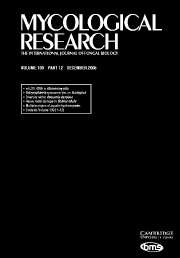Crossref Citations
This article has been cited by the following publications. This list is generated based on data provided by
Crossref.
Wang, H.X
Ng, T.B
and
Ooi, V.E.C
1999.
Studies on purification of a lectin from fruiting bodies of the edible shiitake mushroom Lentinus edodes.
The International Journal of Biochemistry & Cell Biology,
Vol. 31,
Issue. 5,
p.
595.
Wang, H.X.
and
Ng, T.B.
2000.
Isolation of a Novel Ubiquitin-like Protein from Pleurotus ostreatus Mushroom with Anti-Human Immunodeficiency Virus, Translation-Inhibitory, and Ribonuclease Activities.
Biochemical and Biophysical Research Communications,
Vol. 276,
Issue. 2,
p.
587.
Boulianne, Robert P.
Liu, Yi
Aebi, Markus
Lu, Benjamin C.
and
Kües, Ursula
2000.
Fruiting body development in Coprinus cinereus: regulated expression of two galectins secreted by a non-classical pathway The GenBank accession number for the sequence reported in this paper is AF130360.
Microbiology,
Vol. 146,
Issue. 8,
p.
1841.
Wang, Hexiang
Gao, Jiquan
and
Ng, T.B.
2000.
A New Lectin with Highly Potent Antihepatoma and Antisarcoma Activities from the Oyster Mushroom Pleurotus Ostreatus.
Biochemical and Biophysical Research Communications,
Vol. 275,
Issue. 3,
p.
810.
Mo, Hanqing
Winter, Harry C.
and
Goldstein, Irwin J.
2000.
Purification and Characterization of a Neu5Acα2–6Galβ1–4Glc/GlcNAc-specific Lectin from the Fruiting Body of the Polypore Mushroom Polyporus squamosus .
Journal of Biological Chemistry,
Vol. 275,
Issue. 14,
p.
10623.
Wang, Hexiang
and
Ng, T.B.
2001.
Pleureryn, a Novel Protease from Fresh Fruiting Bodies of the Edible Mushroom Pleurotus eryngii.
Biochemical and Biophysical Research Communications,
Vol. 289,
Issue. 3,
p.
750.
Kawagishi, Hirokazu
Takagi, Jun-ichi
Taira, Tomoko
Murata, Takeomi
and
Usui, Taichi
2001.
Purification and characterization of a lectin from the mushroom Mycoleptodonoides aitchisonii.
Phytochemistry,
Vol. 56,
Issue. 1,
p.
53.
Ishikawa, Noemia Kazue
Fukushi, Yukiharu
Yamaji, Keiko
Tahara, Satoshi
and
Takahashi, Kunihide
2001.
Antimicrobial Cuparene-Type Sesquiterpenes, Enokipodins C and D, from a Mycelial Culture of Flammulina velutipes.
Journal of Natural Products,
Vol. 64,
Issue. 7,
p.
932.
Lam, S.K.
and
Ng, T.B.
2001.
First Simultaneous Isolation of a Ribosome Inactivating Protein and an Antifungal Protein from a Mushroom (Lyophyllum shimeji) Together with Evidence for Synergism of their Antifungal Effects.
Archives of Biochemistry and Biophysics,
Vol. 393,
Issue. 2,
p.
271.
Matsumoto, Hanako
Natsume, Ayumi
Ueda, Haruko
Saitoh, Takeshi
and
Ogawa, Haruko
2001.
Screening of a unique lectin from 16 cultivable mushrooms with hybrid glycoprotein and neoproteoglycan probes and purification of a novel N-acetylglucosamine-specific lectin from Oudemansiella platyphylla fruiting body.
Biochimica et Biophysica Acta (BBA) - General Subjects,
Vol. 1526,
Issue. 1,
p.
37.
Lam, S.K.
and
Ng, T.B.
2001.
Hypsin, a Novel Thermostable Ribosome-Inactivating Protein with Antifungal and Antiproliferative Activities from Fruiting Bodies of the Edible Mushroom Hypsizigus marmoreus.
Biochemical and Biophysical Research Communications,
Vol. 285,
Issue. 4,
p.
1071.
Winter, Harry C.
Mostafapour, Kazem
and
Goldstein, Irwin J.
2002.
The Mushroom Marasmius oreades Lectin Is a Blood Group Type B Agglutinin That Recognizes the Galα1,3Gal and Galα1,3Galβ1,4GlcNAc Porcine Xenotransplantation Epitopes with High Affinity.
Journal of Biological Chemistry,
Vol. 277,
Issue. 17,
p.
14996.
Shi, Yu-ling
Benzie, Iris F.F.
and
Buswell, John A.
2002.
Role of tyrosinase in the genoprotective effect of the edible mushroom, Agaricus bisporus.
Life Sciences,
Vol. 70,
Issue. 14,
p.
1595.
Otta, Yumi
Amano, Koh
Nishiyama, Kano
Ando, Akikazu
Ogawa, Shigeru
and
Nagata, Yoshiho
2002.
Purification and properties of a lectin from ascomycete mushroom, Ciborinia camelliae.
Phytochemistry,
Vol. 60,
Issue. 2,
p.
103.
Tegzes, John H
and
Puschner, Birgit
2002.
Toxic mushrooms.
Veterinary Clinics of North America: Small Animal Practice,
Vol. 32,
Issue. 2,
p.
397.
Ng, T.B.
and
Lam, Y.W.
2002.
Isolation of a Novel Agglutinin with Complex Carbohydrate Binding Specificity from Fresh Fruiting Bodies of the Edible Mushroom Lyophyllum shimeiji.
Biochemical and Biophysical Research Communications,
Vol. 290,
Issue. 1,
p.
563.
Sun, Hui
Zhao, Chen Guang
Tong, Xin
and
Qi, Yi Peng
2003.
A Lectin with Mycelia Differentiation and Antiphytovirus Activities from the Edible Mushroom Agrocybe aegerita.
BMB Reports ,
Vol. 36,
Issue. 2,
p.
214.
Wang, Hexiang
Ng, Tzi Bun
and
Liu, Qinghong
2003.
A novel lectin from the wild mushroom Polyporus adusta.
Biochemical and Biophysical Research Communications,
Vol. 307,
Issue. 3,
p.
535.
Oda, Yasuo
Senaha, Tsutomu
Matsuno, Yuuki
Nakajima, Kazuki
Naka, Ryousuke
Kinoshita, Mitsuhiro
Honda, Eiko
Furuta, Itaru
and
Kakehi, Kazuaki
2003.
A New Fungal Lectin Recognizing α(1–6)-linked Fucose in the N-Glycan.
Journal of Biological Chemistry,
Vol. 278,
Issue. 34,
p.
32439.
Rosa, Luiz Henrique
Machado, Kátia M Gomes
Jacob, Camila Cristina
Capelari, Marina
Rosa, Carlos Augusto
and
Zani, Carlos Leomar
2003.
Screening of Brazilian basidiomycetes for antimicrobial activity.
Memórias do Instituto Oswaldo Cruz,
Vol. 98,
Issue. 7,
p.
967.




